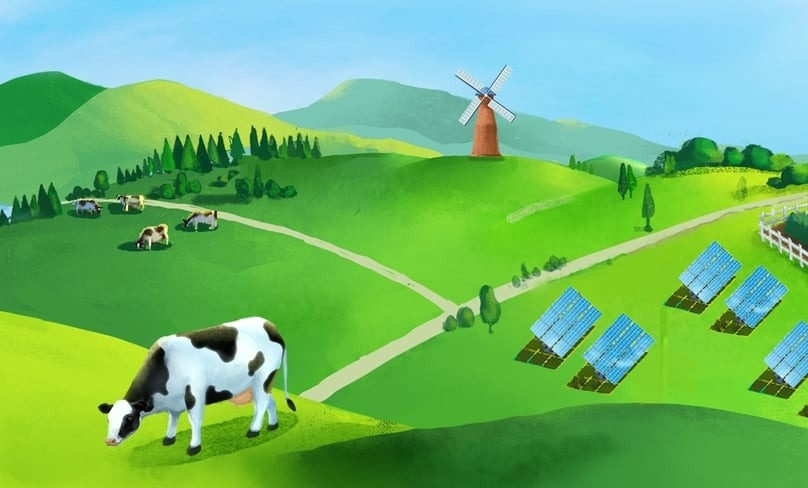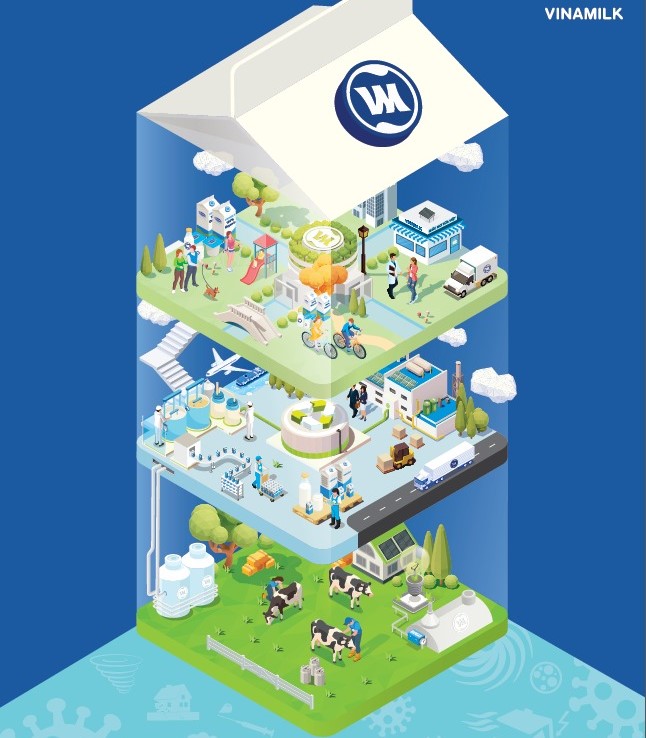
Vinamilk looks to net zero by 2050
Vietnam's leading dairy corporation Vinamilk has announced the Vinamilk Pathway to Dairy Net Zero 2050 project, underwhich the company will reduce its greenhouse gas (GHG) emissions by 15% in 2027 and 55% in 2035, before reaching net zero by 2050.
Circular economy model at million-dollar farms
Entering the Vinamilk farm in the southern province of Tay Ninh, one is immersed in a vast expanse of greenery and fresh air. It would be understandable for people to forget they are in a giant dairy farm with up to 8,000 cows. There is no unpleasant odor from the waste and no untreated wastewater released into the environment. This "dairy resort" covers nearly 700 hectares and stands out as a lushgreen oasis in the hot and sunny district of Ben Cau.
As a leader in the sector, Vinamilk plays a significant role in advancing high-tech dairy farming in the country, as also advancing sustainable development by balancing business growth with corporate social responsibility, which includes several activities like environmental protection.
With a network of 13 cattle farms across the country and non-stop investments for business expansion, how is Vinamilk promoting sustainable development given that the agriculture sector is facing escalating climate change and water pollution?
Turning waste into usable resources is one of the highlights of Vinamilk's sustainable development efforts, aiming to find solutions to reduce waste generation and minimize its environmental impacts. One of the important principles in this circular economy model is “nothing is waste".
At Vinamilk's farms, livestock waste is collected and processed, using modern technology and a biogas system, into fertilizer for grass and trees. Another product of this process is methane gas, which can heat water to 90 degrees that is then used for sterilizing equipment and pasteurizing milk. This process helps to reduce a significant amount of CO2 emissions, cutting the effects of greenhouse gases.
Organic farming is one of the important keys in Vinamilk’s sustainable development strategy. In 2016, Vinamilk’s Organic Dalat Farm in the Central Highlands province of Lam Dong became the "first organic dairy farm in Vietnam to meet European standards", certified by the Netherlands-based global organization Control Union. It was an important milestone in Vinamilk's journey to boost the dairy sector’s efficiency based on eco-friendly development.
Based on organic standards, Vinamilk has focused its investments on soil sources, grass plantation, feed, farmingmethods, veterinary standards, waste treatment, and environmental protection. The cows are fed non-genetically modified grass with zero pesticides or chemical fertilizers, and all cows are free from growth hormones.
These strict conditions have created clean, nutritious, safe and organic dairy products which play an important role in reducing water pollution, refreshing the air, and protecting the environment.
Industrial cultivation can harm the soil and cause erosion and degradation, not to mention other risks of overexploitation. Fully aware of this, Vinamilk aims to use land resources responsibly and optimize its cyclical regeneration. Land resources are managed and handled to retain their maximum value and natural organic nutrients through organic farming, advanced agricultural productionpractices, hi-tech cultivation, crop rotation, and optimizing organic fertilizer sourced from cows.
As of 2019, Vinamilk's organic grassland for dairy cow farming had increased tenfold compared to 2016 when the company opened its first organic farm in Vietnam. In recent years, Vinamilk has applied advanced agricultural cultivation techniques based on Japanese technology on many farms to increase the fertility and nutritious content of the soil as a substitute for chemicals and inorganic fertilizers.
The UN predicts that by 2030, the demand for natural resources will triple compared to the present level. This demand will exceed the capacity of our natural resources. Sustainable development-oriented businesses must reduce their reliance on traditional energy by boosting renewable energy and minimizing environmental pollution.
Vinamilk has set the prioritization of eco-friendly technologies and green energy as the focus of its sustainable development strategy. Its Dalat organic farm is one of the first farms in Vietnam to have asolar energy system. It was the initial step later replicated nationwide. In 2019,Vinamilk started to use new high-capacity, energy-efficient equipment, with priority given to modern technology and engines that meet strict emissions requirements. These machines have fuel-saving modes using soft starters and frequency converters. This has contributed to reducing electricity costs and CO2 emissions. For Vinamilk, dairy farms are the “nucleus” of its development and it will continue to implement a model that improves farmers’ livelihoods while making agriculture and animal husbandry sustainable operations
In addition, Vinamilk will continue to implement a developmentmodel with a combination of agriculture, countryside and farmers to improve farmers’ livelihoods and develop sustainable agricultureand husbandry to perfect its value chain.
“Vinamilk will continue to secure bigger achievements to achieve its sustainable development goals,” Vinamilk CEO Mai Kieu Lien said. With this orientation, Vinamilk's approach is to evaluate the environmental impacts of its business operations. Each activity in the value chain is an opportunity to apply the concept of a circular economy based on the principles of green investment, responsibleexploitation, efficient usage, and recycling.

Illustration of Vinamilk's green business activities. Photo courtesy of the company.
First Vietnamese dairy company to have factories andfarms achieve carbon neutrality
As a pioneer in implementing sustainable development strategies, Vinamilk was recently named by the Nhip Cau Dau Tu (Investment Bridge) magazine on its list of the 50 top sustainable companies in Vietnam, particularly for its carbon footprint reduction and for products leading responsible consumption.
As a leading dairy enterprise in Vietnam, with a system of hi-tech factories and farms, Vinamilk has built an action program toward net-zero emissions by 2050, focusing on four key areas: sustainable agriculture, green production, eco-friendly logistics, and sustainable consumption.
Vinamilk’s Nghe An Dairy Factory and Nghe An Dairy Farm inthe central province of Nghe An were the first two units of the company to receive a certificate of carbon neutrality from international assessment organizations subject to the PAS 2060 standards. Vinamilk is also recognized as the first dairy company in Vietnam to have both factories and farms that have reached carbon neutral subject to these standards. Total greenhouse gas (GHG) emissions from these units has been cut to 17,560 tons of CO2 (equivalent toabout 1.7 million trees) thanks to Vinamilk’s efforts to reduce emissions in production, husbandry, and increasing its green spacesto absorb GHGs.
Nguyen Dinh Minh Tam, a representative of the British Standards Institute, the certifying body, said Vinamilk is striving for sustainable development through accurate and careful GHG monitoring, and appropriate emission reduction roadmaps.
According to Bureau Veritas of the UK, the body that certified Vinamilk's farms in Nghe An, cutting GHG emissions and moving to net zero in the dairy industry is an enormous challenge, especially with large-scale dairy farms. Achieving this goal requires extra attention to investment in technological solutions, green energy transformation, and developing a circular economy model.
To be highly recognized, Vinamilk has constantly improved to meet the rigorous screening norms of sustainable enterprise criteria and ledinitiatives for sustainable development in three areas: business, environment, and society.
"The results achieved by Vinamilk have greatly encouraged the net zero journey of the entire dairy industry," said Nguyen Viet Dung, CEO of Bureau Veritas.
A Vinamilk representative said that in addition to its commitment to the community, the company hopes to spread a more positive and stronger message to businesses to promote collaboration with the Vietnamese government on the net zero journey for a greener and more sustainable future.




